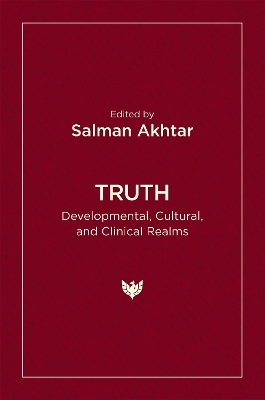
Truth
Phoenix Publishing House (Verlag)
978-1-80013-142-2 (ISBN)
This edited collection gathers together erudite and considered contributions from Salman Akhtar, Cobi Avshalom, Brett Clarke, Mali Mann, Gila Ofer, Thomas Ogden, Louis Rothschild, Batya Shoshani, Michael Shoshani, Naama Shoshani-Breda, Ann Smolen, Donald Spence, Richard Waugaman, Thomas Wolman, and Vamık D. Volkan.
Fifteen distinguished authors bring together their vast experience as psychologists, psychiatrists, psychoanalysts, social workers, and psychotherapists to present a nuanced and in-depth investigation into the concept of truth. Divided into five parts, the book begins with a thoughtful discussion from Brett Clarke on what truth means and its role in psychoanalysis. It then moves into the realm of development, looking at truth from the viewpoint of children, adolescents, and adults. Stepping from development to culture, the works of Shakespeare, Heidegger and Freud are brought into the debate alongside the relationship of truth with individual and large-group psychology. Next come four chapters taking ‘truth’ into the clinical realm, grounding theory in practice. The book is brought to completion by an epilogue from Louis Rothschild answering the vital question: ‘Truly, what does all this mean?’
A must-read book for practising clinicians and academics in the mental health and humanities fields that investigates the wide range of theories on truth, how they have changed over the years, and their practical applications.
Salman Akhtar, MD, is Professor of Psychiatry at Jefferson Medical College and a Training and Supervising Analyst at the Psychoanalytic Center of Philadelphia. He has served on the editorial boards of The International Journal of Psychoanalysis, the Journal of the American Psychoanalytic Association, and the Psychoanalytic Quarterly. His nearly 400 publications include 99 books, of which the following 20 are solo-authored: Broken Structures (1992), Quest for Answers (1995), Inner Torment (1999), Immigration and Identity (1999), New Clinical Realms (2003), Objects of Our Desire (2005), Regarding Others (2007), Turning Points in Dynamic Psychotherapy (2009), The Damaged Core (2009), Comprehensive Dictionary of Psychoanalysis (2009), Immigration and Acculturation (2011), Matters of Life and Death (2011), The Book of Emotions (2012), Psychoanalytic Listening (2013), Good Stuff (2013), Sources of Suffering (2014), No Holds Barred (2016), A Web of Sorrow (2017), Mind, Culture, and Global Unrest (2018), and Silent Virtues (2019). Dr Akhtar has delivered many prestigious invited lectures including a Plenary Address at the 2nd International Congress of the International Society for the Study of Personality Disorders in Oslo, Norway (1991), an Invited Plenary Paper at the 2nd International Margaret S. Mahler Symposium in Cologne, Germany (1993), an Invited Plenary Paper at the Rencontre Franco-Americaine de Psychanalyse meeting in Paris, France (1994), a Keynote Address at the 43rd IPA Congress in Rio de Janiero, Brazil (2005), the Plenary Address at the 150th Freud Birthday Celebration sponsored by the Dutch Psychoanalytic Society and the Embassy of Austria in Leiden, Holland (2006), and the Inaugural Address at the first IPA-Asia Congress in Beijing, China (2010). Dr Akhtar is the recipient of numerous awards including the American Psychoanalytic Association’s Edith Sabshin Award (2000), Columbia University’s Robert Liebert Award for Distinguished Contributions to Applied Psychoanalysis (2004), the American Psychiatric Association’s Kun Po Soo Award (2004) and Irma Bland Award for being the Outstanding Teacher of Psychiatric Residents in the country (2005). He received the highly prestigious Sigourney Award (2012) for distinguished contributions to psychoanalysis. In 2103, he gave the Commencement Address at graduation ceremonies of the Smith College School of Social Work in Northampton, MA. Dr Akhtar’s books have been translated into many languages, including German, Italian, Korean, Persian, Romanian, Serbian, Spanish, and Turkish. A true Renaissance man, Dr Akhtar has served as the Film Review Editor for The International Journal of Psychoanalysis, and is currently serving as the Book Review Editor for the International Journal of Applied Psychoanalytic Studies. He has published 9 collections of poetry and serves as a Scholar-in-Residence at the Inter-Act Theatre Company in Philadelphia.
Acknowledgments
About the editor and contributors
Introduction
Prologue
1. The meaning of ‘truth’ and the truth about ‘meaning’ in psychoanalysis
Brett Clarke
Part I: Developmental Realm
2. Children and truth
Mali Mann
3. The search for truth in adolescent rebellion
Ann Smolen
4. Truth in later life
Thomas Wolman
Part II: Cultural Realm
5. “Nothing is Truer than Truth” and Shakespeare
Richard Waugaman
6. Explorations into truth, anxiety, and death by Heidegger and Freud
Michael Shoshani, Batya Shoshani, and Naama Shoshani-Breda
7. Finding the truth in individual and large group psychology
Vamık D. Volkan
Part III: Clinical Realm
8. Narrative truth and theoretical truth
Donald Spence
9. What is true and whose idea was it?
Thomas Ogden
10. Truth heals, if one can tolerate it
Cobi Avshalom and Gila Ofer
11. Seven types of truth and their clinical relevance
Salman Akhtar
Epilogue
12. Truly, what does all this mean?
Louis Rothschild
References
Index
| Erscheinungsdatum | 28.10.2023 |
|---|---|
| Zusatzinfo | 1 Charts |
| Sprache | englisch |
| Maße | 189 x 246 mm |
| Gewicht | 514 g |
| Themenwelt | Geisteswissenschaften ► Philosophie |
| Geisteswissenschaften ► Psychologie ► Psychoanalyse / Tiefenpsychologie | |
| ISBN-10 | 1-80013-142-9 / 1800131429 |
| ISBN-13 | 978-1-80013-142-2 / 9781800131422 |
| Zustand | Neuware |
| Haben Sie eine Frage zum Produkt? |
aus dem Bereich


